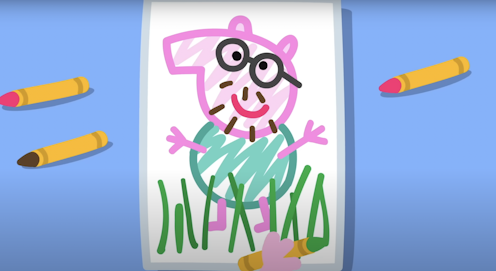
The children’s show Peppa Pig, first screened in the United Kingdom in 2004, is now broadcast in more than 170 countries and has become a billion-dollar brand. Its smart three-act structure, told in five-minute episodes, has been used to teach creative writing and even to help us think philosophically.
Having watched Peppa Pig for 12 years with my own kids, I’m always drawn back to Daddy Pig – the cheerful, striving figure who is often considered “silly” by his children.
Daddy Pig is constantly being fat-shamed and ridiculed, yet he remains steadfast and hardworking. He is jovial, explains science to his family, (eventually) listens to his wife and children and, most importantly, never loses his patience.
This Father’s Day, I’d like to take this opportunity to recognise Daddy Pig for being a role model for dads all over the world.
A hapless dad?
Daddy is a classic example of the “hapless dad” trope commonly found in family-oriented films and TV shows. These father figures are typically portrayed as well-meaning, but clueless and inept when it comes to handling chores and responsibilities.
Hapless dads struggle to cook, clean or care for children, and rely on others (usually the mother) to bail them out. They have good intentions, but they’re bad at following through – and their efforts often backfire.
In the episode Pancakes, Daddy’s flipped pancake sticks to the ceiling. In Daddy Loses His Glasses, he realises he has been sitting on his glasses for the whole episode. Each episode invariably ends with everyone laughing at “silly Daddy”, including Daddy himself.
In my favourite episode, Daddy Puts Up A Picture, Daddy hammers a nail into a wall, with predictably unfortunate results. But he keeps calm. He asks Peppa and George to help him as he plasters and paints to repair the damage. He then bathes them and everything returns to normal.
It’s a great example of how to create tension in storytelling: will Daddy clean everything up before Mummy Pig gets home? It also teaches a valuable life lesson: don’t panic.
Daddy Pig isn’t hapless. He is a wonderful role model who always gives 100% to his work, exuding a warmth and stoicism that ennobles us.
Comic relief
Comic relief characters in children’s TV and literature personify cheerfulness and jokiness. Comedy seeks to minimise the anxieties felt by the reader or audience, by reinforcing the message that life is not to be taken too seriously.
As children’s literature expert Kerry Mallan noted in 1993, these characters have faults:
they may, for instance, be vain, lazy, frivolous, clumsy or naive but these faults are not fatal […] and the reader or audience is able to laugh at the comic character’s expense.
Daddy Pig declares himself “a bit of an expert” in several things, including map reading, kite flying and trumpet playing, but is usually proven clueless. He says he can speak French, but he can’t.
These bungling, clumsy attempts to exert his patriarchal authority gently poke fun at traditional gender stereotypes and portray Daddy as someone who is at ease with his own frailties.
Children will chuckle at slapstick situations such as Daddy getting stuck in cement, while adults will appreciate the more subtle humour such as how Daddy fixes the computer by turning it off and on again, or when he sends his family to sleep while reading them a book on concrete. This double play of humour links Daddy Pig back to the Shakespearean fool.
Yet, every once in a while, Daddy also gets to “win” an episode. In Long Train Journey, Daddy is invited to go overseas for work. He is treated like royalty, served coffee and orange juice in the buffet car (not even the king is afforded such luxury) and is finally recognised for his fame and expertise in all matters of concrete.
Importance of play
Researchers have noticed the importance of father–child play. Like Bandit from Bluey, Daddy’s play is often physical, spontaneous and playful.
In Daddy’s Birthday, he is the happiest when jumping in muddy puddles with Peppa and George. In Marble Run, he turns the whole house into a marble run course – and the children are delighted.
In Camping, Daddy shows Peppa and George how to light a campfire by rubbing two sticks together. He could just use the matches Mummy Pig offers, but he perseveres and eventually the fire is lit – and everyone cheers.
Daddy’s playful nature helps create a positive and enjoyable environment for his family. He is actively involved in their lives and is always there to give love and support during important moments.
Daddy Pig, we salute you
After nearly 400 episodes, Daddy Pig continues to embody the lovable yet imperfect patriarch, whose actions demonstrate the importance of family values, hard work and knowing when to quit. Richard Ridings, the British actor who has voiced the character since 2004, has often reiterated Daddy Pig’s resilience.
In Father’s Day, Peppa and George make Daddy a cake full of cereal, ketchup and blue cheese. Daddy’s response? “Tasty!”
Despite all the slings and arrows thrown his way, Daddy Pig embraces life, shakes off its frustrations and keeps his spirits up. What more could you ask for?
Ben McCann does not work for, consult, own shares in or receive funding from any company or organisation that would benefit from this article, and has disclosed no relevant affiliations beyond their academic appointment.
This article was originally published on The Conversation. Read the original article.







